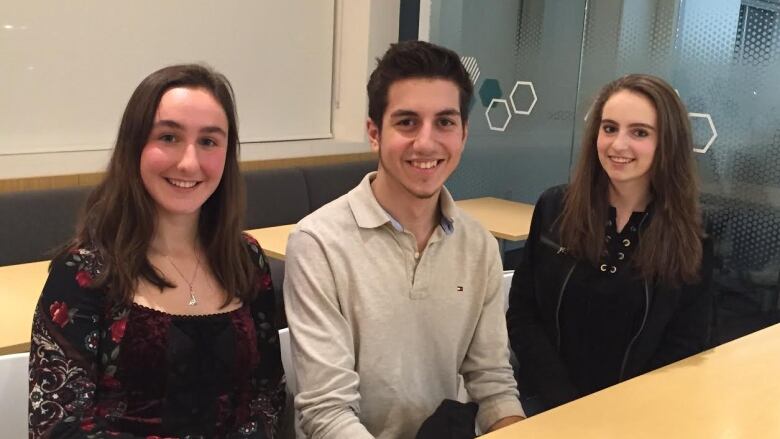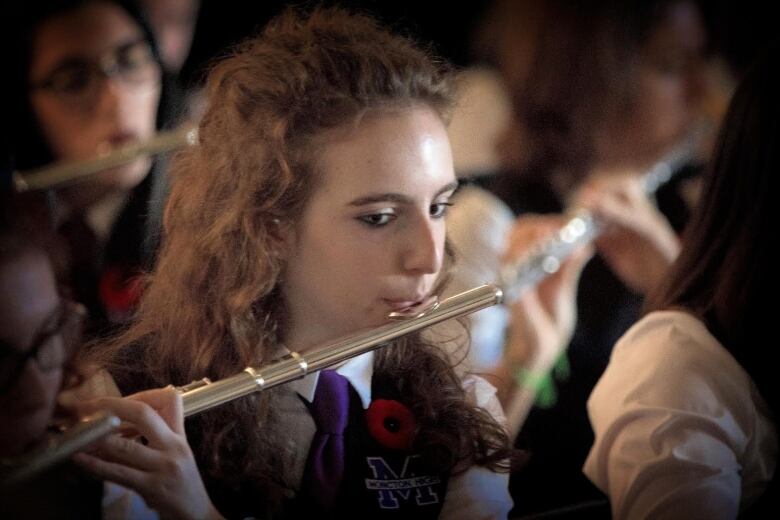Inclusive education doesn't challenge high achievers, students say
Moncton High School students say removal of intensive, accelerated courses in Grades 9 and 10 is a mistake

Three high school students in Moncton are calling for a return toenriched classes for students who excel academically, saying the inclusive education modelin New Brunswick isn't working.
"I don't really think that inclusive learning in the long term can work at all," said GillianFinney, a Grade 11 student at Moncton High School.
"But with [separate]classes you can give support to the people who need help, and those who don't need help are really allowed to excel, so that's a really awesome situation to be in."
-
Mother of autistic son gives inclusive education a failing grade
-
Time to stop hiding behind 'illusion of inclusion' in classrooms
New Brunswick's policy of inclusive education, which was last updated in September 2013, requires all students bewith their peers in a "common learning environment" and that instruction be primarily provided by the classroom teacher.
It's not the teachers' fault, it's not the other students' fault, it's just a bad situation.- Grade 11 studentHayleyTouchburn
Under the policy, segregated classes or programs based on a "disability of exceptionality" are not allowed.
In the Anglophone East School District, the policy was further tightened up whenintensive and accelerated classes for Grades 9 and 10 were recently eliminated in favour of "a common curriculum."
Hayley Touchburn, aGrade 11 student, said people like the idea of inclusion because no one is left out, but in reality, everyone knows who is struggling and who is excelling.
"It's not like everyone thinks, 'Oh, we're all exactly the same level of intelligence, we all think exactly the same.' No everyone kind of already knows."

"You know it's fun to help people once in a while but getting bored and not being able to do work that is challenging you, and just kind of being stuck at that level It's not the teachers' fault, it's not the other students' fault. It's just a bad situation."
All students deserve to be challenged
Although enrichment classes have been dropped for Grades 9 and 10, students in Grades 11 and 12 can still take advanced level courses, depending on what they plan to do after high school.
Grade 12 student Eddie Anghelsaid enriched classes made a big difference to his education.
"I was great with it because we moved at a faster pace and I feel that if I was in the normal level classes for me, there wouldn't be that challenge or that extra motivation to work harder."

"I just remember being so relieved and kind of shocked at how fun school could be,"Touchburnsaid. "I never really realized how many great discussions, how it felt normal to raise your hand and not feel like, 'Am I raising my hand too much? Are people going to judge me?' No because everyone is raising their hand."
"It's such a great feeling to have fun at school and I kind of realized ...it's a bit of a shame that I haven't felt like this before Grade 9."
Yvan Pelletier, a subject co-ordinator with the Anglophone East school district for Grades 6 to 12, said teachers are expected to meet the needs of all students in their classrooms whether they need extra support or enrichment.
"The main thing is we want to try to go towards a deeper learning for the students in order to provide more stretch learning," he said.
"Yes, the students are getting common core curriculum but there should be opportunities for students in each of those classes to be challenged."
Inclusive learning 'a great idea'
Anghel, who plansto go on to university and is considering becoming a surgeon, said being a high achiever was something he often tried to hide in the inclusive classroom.
The research is pretty clear that children who are bright and talented achieve just as high results in inclusive classrooms as they do in stand-alone classrooms.- Gordon Porter
"Sometimes it can be even a little bit intimidating for those who are excelling. ... I feel like it becomes more of a thing 'Oh,I need to hide my marks so people don't notice that I'm doing well so that people aren't like, Oh, wow, you got 100 again.'"
Finney said she, too, has hesitated to raise her hand many times in the regular classroom.
"Intheory, inclusive learning would be a great idea because then everyone's mixed together and everyone can help everybody," she said. "But we can see even today that that doesn't work."
Gordon Porter, director of Inclusive Education Canada, advised New Brunswick on its inclusive education policy and told CBCearlier this month that all special classes take resources away from regular classrooms and that in turn weakens the education system.
"The research is pretty clear that children who are bright and talented achieve just as high results in inclusive classrooms as they do in stand-alone classrooms," Porter said.

But Anghelargued that people who make decisions about education in New Brunswick should listen to students.
"It seems all of these decisions are coming from officials and higher-ups who really haven't been hands on in the school system, who haven't been teachers for years, who haven't seen students for years ... and it just seems like they're not taking our input on it and I think that's something that they should, because it's our education. It's not theirs anymore."
This was the secondof two stories looking at the impact of New Brunswick'sinclusive education policy on students and their families. The first story, on Tuesday, focused on a student with autism who struggled throughout his years in an inclusive classroom.












_(720p).jpg)


 OFFICIAL HD MUSIC VIDEO.jpg)
.jpg)



























































































